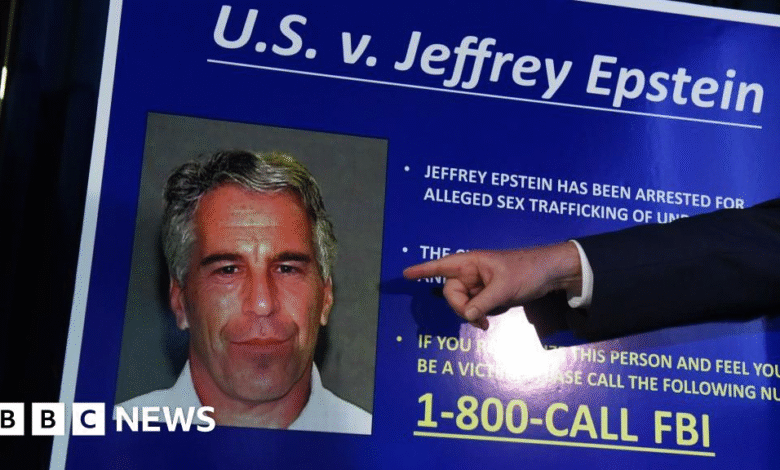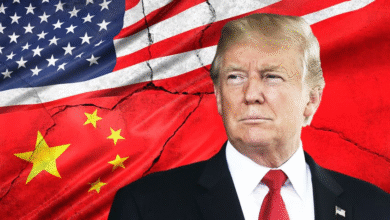Trump Epstein Grand Jury Records Request Denied by Judge

The revelations surrounding the Trump Epstein grand jury records have stirred a significant amount of controversy and intrigue, particularly in light of the recent federal court ruling by Judge Richard Berman. This ruling firmly denied the Trump administration’s attempts to unseal critical grand jury materials associated with Jeffrey Epstein’s criminal case, describing the request as a “diversion” from the extensive evidence already compiled against Epstein. With a trove of documents exceeding 100,000 pages, the judge emphasized that the administration’s focus on unsealing a mere 70 pages of grand jury records was unwarranted. This legal battle demonstrates the complexities tied to the Epstein court ruling and highlights the ongoing scrutiny faced by the Trump administration regarding its request for transparency. Understanding the implications of Judge Berman’s ruling not only reflects on the judicial process but also underscores the entangled narratives surrounding Epstein and high-profile figures linked to him.
In the ongoing saga of the Jeffrey Epstein case, the implications of the Trump administration’s struggles to access grand jury records have become a focal point of legal and political discourse. The recent judicial decision underscored the futility of the administration’s efforts to unveil sealed materials from the grand jury, which have been deemed secondary to a wealth of evidence already available. Judge Richard Berman’s ruling serves as a pivotal reference point, exemplifying the courts’ stance on transparency regarding sensitive information from the Epstein affair. This court action not only encapsulates a battle for information but also reflects broader themes of accountability and the intricacies surrounding high-profile judicial inquiries. As the public seeks clarity on the expansive Epstein files, the narratives surrounding the Trump administration’s attempts become increasingly intertwined with legal precedents and political motives.
Judge Berman’s Critique of Trump’s Request
Federal Judge Richard Berman’s recent decision to deny the Trump administration’s request to unseal Jeffrey Epstein’s grand jury records highlights a critical evaluation of the motivations behind such a request. In his ruling, Judge Berman characterized the plea from the Trump administration as a ‘diversion’ from what he deemed a far more pressing issue: the already existing extensive collection of evidence compiled by the government. Judge Berman emphasized that the existing trove of Epstein documentation, which encompasses approximately 100,000 pages, dwarfs the limited scope of 70 pages suggested by the grand jury materials. This suggests a preoccupation with sensationalism rather than substantive legal inquiry, raising questions about the actual intent behind the request for these specific documents by the Trump administration and its legal team.
Moreover, the repeated failures of the Trump administration to secure the release of the Epstein grand jury records signal a persistent struggle within the legal system concerning high-profile figures and their associated scandalous pasts. Judge Berman pointed out that the extensive investigation into the Epstein case has already provided the public with ample documentation, thereby minimizing any necessity for releasing the grand jury records. Critically, this ruling showcases the judicial system’s cautious approach to ensuring that sensational demands do not overshadow the substantive judicial processes that have already taken place regarding the Epstein saga.
The Implications of Unsealing Grand Jury Materials
The implications of unsealing grand jury materials in cases involving notorious figures like Jeffrey Epstein extend beyond mere public curiosity; they touch upon the integrity of the judicial process and the rights of individuals involved. The Trump administration’s persistent requests highlight the tension between transparency and the normal operations of grand jury procedures, which are designed to safeguard witnesses and encourage free testimony without the fear of public scrutiny. As Judge Berman articulated, the meticulous investigations already conducted by the government have resulted in numerous disclosures, rendering the request for additional material somewhat superfluous in nature.
Furthermore, the refusal to unseal these documents bolsters the argument that indiscriminate public access to all judicial records may not always serve the interests of justice. The Epstein case, laden with complexities involving powerful individuals, has shown that not all materials are appropriate for public dissemination. The caution exercised by judges in these cases reminds all stakeholders that while accountability is paramount, the mechanisms of accountability must respect procedural boundaries, such as those outlined by Judge Richard Berman. Overall, the decision not to unseal the grand jury records aligns with maintaining a careful balance in the pursuit of justice.
Justice Department’s Strategy on Epstein Files
The Justice Department’s strategy concerning the release of documents related to Jeffrey Epstein has evolved significantly, particularly under the Trump administration. Initially, there was a commitment expressed to declassify and publicly disclose relevant documents, a promise that garneredattention from both Trump supporters and critics. However, critiques arose regarding the actual transparency achieved during this period, as noted by Judge Berman in his denouncement of the request for grand jury records as a ‘diversion’ from public disclosures that had already been made. This situation reflects the complex dynamics between political pressures and adherence to judicial processes, creating skepticism about the government’s true intentions regarding Epstein-related disclosures.
In addition to Judge Berman’s ruling, wider implications of how the Justice Department approaches the Epstein case also resonate through various legal rulings, including previous denials by other judges to unseal grand jury records related to Epstein’s associate, Ghislaine Maxwell. Each denial sends a clear signal that the government has a robust collection of materials that should take precedence over the unsealing of additional documents. Thus, the strategic approach taken by the Justice Department serves to highlight an ongoing struggle for transparency amidst a backdrop of significant public interest and the need for legal integrity.
Historical Context of Legal Proceedings Against Epstein
The legal proceedings against Jeffrey Epstein have a long and complicated backdrop, intertwined with significant political and social implications. Epstein’s history of legal troubles, particularly his 2008 plea deal in Florida, raised serious questions regarding the justice system’s ability to hold powerful individuals accountable for sexual offenses. The ramifications of past judicial decisions continue to echo in current rulings, such as Judge Richard Berman’s refusal to unseal grand jury materials. This historical context sheds light on the evolving strategies employed in high-profile cases, particularly those involving figures who have previously maneuvered through the legal system with relative ease.
Moreover, the context of Epstein’s criminal activities and his connections to prominent individuals serve as a reminder of the intersection between wealth, power, and the law. The pressure exerted on the Trump administration to disclose the Epstein files became more pronounced in light of the historical leniency shown toward Epstein in past legal dealings. As a result, the insistence on greater transparency, such as the unsealing of grand jury records, reflects a societal demand for accountability that addresses past injustices and aims to safeguard against future mishandling of similar cases.
The Fallout from Donald Trump’s Association with Epstein
Donald Trump’s association with Jeffrey Epstein adds a deeply controversial layer to the ongoing discussions surrounding the release of grand jury records. As allegations and past interactions circulate within the public sphere, Trump’s relationship with Epstein draws increased scrutiny, especially in the wake of Judge Berman’s ruling. The complexities of this relationship highlight the broader implications of privilege and the challenges faced in pursuing transparency in cases that involve figures of considerable influence. The courts’ consistent refusals to unseal grand jury materials reflect hesitations about the potential fallout that could arise from exposing the full extent of evidence related to Epstein, especially concerning prominent individuals like Trump.
Additionally, the legal battles surrounding Epstein and allies connected to him have unveiled the intricacies of applying justice in cases where societal elites are implicated. The refusal to provide Trump with additional materials or records not only serves to defend the integrity of the judicial process, but it also presents an opportunity for public discourse on accountability within the justice system. Many advocates for reform are pushing for transparency, underscoring that uncovering the full truth holds significance for victims and for the health of the legal system at large.
Continuing Investigations into the Epstein Case
Despite numerous legal setbacks, investigations into Jeffrey Epstein’s operations and associates remain vigorous. Recent rulings denying the release of grand jury materials affirm that the legal journey surrounding Epstein’s case is ongoing and complex. Additionally, the scrutiny on Epstein’s high-profile connections integrates a broader narrative about accountability and the pursuit of justice for survivors of sexual abuse. As authorities continue to compile evidence and testimonies, there is a societal expectation that the ongoing investigations will ultimately yield answers needed to facilitate healing and justice for those affected.
Assertions regarding incomplete disclosures or inadequate investigations emphasize a necessity for consistent oversight of high-profile cases that engage public interest. The results of these investigations could potentially reshape public understanding of the events that transpired around Epstein, reinforcing the demand for the truth. The ongoing discourse highlights that as investigations unfold, the legal repercussions tied to such a notorious figure remain a focal point for societal dialogue about accountability within the justice system.
Public Perception of the Epstein Case and Its Connections
Public perception of the Jeffrey Epstein case has remained charged amid the ongoing legal proceedings and the high-profile figures connected to him. The rejection of the Trump administration’s request to unseal grand jury materials has further fueled debate about transparency within the judicial system. The narrative surrounding Epstein has navigated through the realm of conspiracy theories and rampant speculation, transforming a legal case into a public spectacle. This dramatic evolution speaks volumes about how cases involving figures of wealth and influence can distort public perceptions and drive a narrative all their own.
Moreover, the fervor surrounding public interest in the Epstein case, especially regarding high-profile connections to individuals like Trump, has reinforced the need for comprehensive media coverage that balances spectacle with accurate reporting. As new developments emerge, the implications of such connections will continue to provoke discussion and shape public understanding of the case. The importance of trustworthy journalism that keeps audiences informed while adhering to ethical standards cannot be understated, particularly when dealing with sensitive topics related to sexual abuse and exploitation.
The Role of Media in Reporting on Epstein’s Case
Media coverage of the Jeffrey Epstein case has played a pivotal role in framing public discourse around the multitude of allegations and the complex web of figures involved. Reporting on high-profile legal cases tends to grapple with the fine line between sensationalism and responsible journalism, particularly in cases as fraught as Epstein’s. The ongoing refusal of the courts to unseal certain grand jury materials only magnifies media interest and scrutiny surrounding potential implications involving individuals like Trump. It brings forth questions about how media narratives impact public perceptions and the ongoing fight for justice surrounding Epstein’s victims.
Furthermore, the media’s role extends beyond simply reporting events; it involves holding powerful figures accountable while ensuring that the privacy and dignity of victims are respected. Comprehensive coverage of the Epstein case should not solely highlight controversies involving influential personalities but must also prioritize the voices of victims whose stories deserve to be heard. By achieving a balance in coverage, the media can contribute to a broader societal push for accountability while fostering informed discussions surrounding the nuances of justice in cases involving sexual exploitation.
Future Developments in Epstein-Related Cases
As judicial proceedings surrounding Jeffrey Epstein continue to unfold, future developments hold the potential to significantly change the trajectories of implicated individuals and the case as a whole. The denials from Judge Richard Berman and other judges reflect a cautious court environment that bears the weight of public interest while adhering to the principles of judicial integrity. Future rulings regarding the release of grand jury materials and other related documents will likely shape the discourse surrounding accountability and transparency not only for Epstein but also for all who are connected to him.
Moreover, ongoing investigations and potential trials related to associates of Epstein signify that while some narratives might become quieter, they are far from over. Society is collectively aware that complexities concerning wealth, power, and abuse of privilege remain prevalent. Future strategies pursued by courts and attorneys involved in Epstein-related cases will thus be pivotal in determining how justice is approached, whether through holding prominent figures accountable, revealing more about the inner workings of Epstein’s operations, or providing closure for the victims.
Frequently Asked Questions
What did the judge say about the Trump administration’s request for Epstein grand jury records?
Judge Richard Berman described the Trump administration’s request to unseal grand jury materials in the Jeffrey Epstein case as a ‘diversion’ from the substantial amount of files already compiled by the government. The judge emphasized that the extensive trove of documents on Epstein’s case far exceeds the limited grand jury materials requested.
Why did the judge deny the Trump administration’s grand jury materials request?
The request was denied because the judge found no compelling reason to unseal the Epstein grand jury records, stating that the Trump administration does not need court approval to access the comprehensive Epstein files that have already been amassed.
What implications did Trump’s request for Epstein grand jury records have?
Trump’s request for the Epstein grand jury records indicates significant interest in the case, amidst claims that his administration aimed to declassify documents related to Epstein. However, judges have repeatedly rejected these attempts, citing a lack of necessity given the already available information.
How has the Trump administration’s handling of Epstein-related materials been criticized?
The Trump administration has faced criticism for its handling of Epstein-related materials, with judges expressing skepticism about claims that unsealing grand jury records would provide new insights into the Jeffrey Epstein case. There have been assertions that the administration’s actions were politically motivated or misleading.
What did the federal judge observe about the volume of Epstein documents versus grand jury records?
Judge Richard Berman noted that the government possesses a comprehensive collection of around 100,000 pages of Epstein-related files, which substantially overshadows the mere 70 pages of grand jury materials requested by the Trump administration. This observation played a key role in the judge’s decision to deny the request.
What previous actions were taken by other judges regarding Epstein grand jury materials?
Judge Richard Berman is the third judge to deny the Trump administration’s requests to unseal Epstein-related grand jury materials. His ruling follows similar decisions from other judges who rejected the DOJ’s bid, reinforcing the idea that existing investigations have already sufficiently addressed Epstein’s case.
| Key Point | Details |
|---|---|
| Judge’s Denial | A federal judge denied Trump’s request to unseal grand jury materials in Epstein’s case, deeming it a ‘diversion’. |
| Judge’s Comments | Judge Richard Berman criticized the request, stating the government already holds significant evidence amounting to about 100,000 pages. |
| Previous Rulings | Berman is the third judge to reject similar requests from the Trump administration concerning Epstein grand jury materials. |
| Government’s Responsibility | Judge Berman asserted that the Trump administration should disclose Epstein’s files instead of relying on the courts. |
| Context of the Request | Under pressure, Trump directed the DOJ to seek grand jury materials, aiming to fulfill his prior promise to declassify them. |
Summary
Trump Epstein grand jury records have become a focal point of controversy as a federal judge has rejected the Trump administration’s request to unseal materials related to Jeffrey Epstein’s criminal case. This denial follows a broader context where the court has repeatedly seen attempts to access these records as a diversion from a wealth of existing evidence. Despite Trump’s past commitments to reveal these documents, the ongoing legal battle highlights significant obstacles and suggests a potential abandonment of transparency regarding Epstein-related files.




